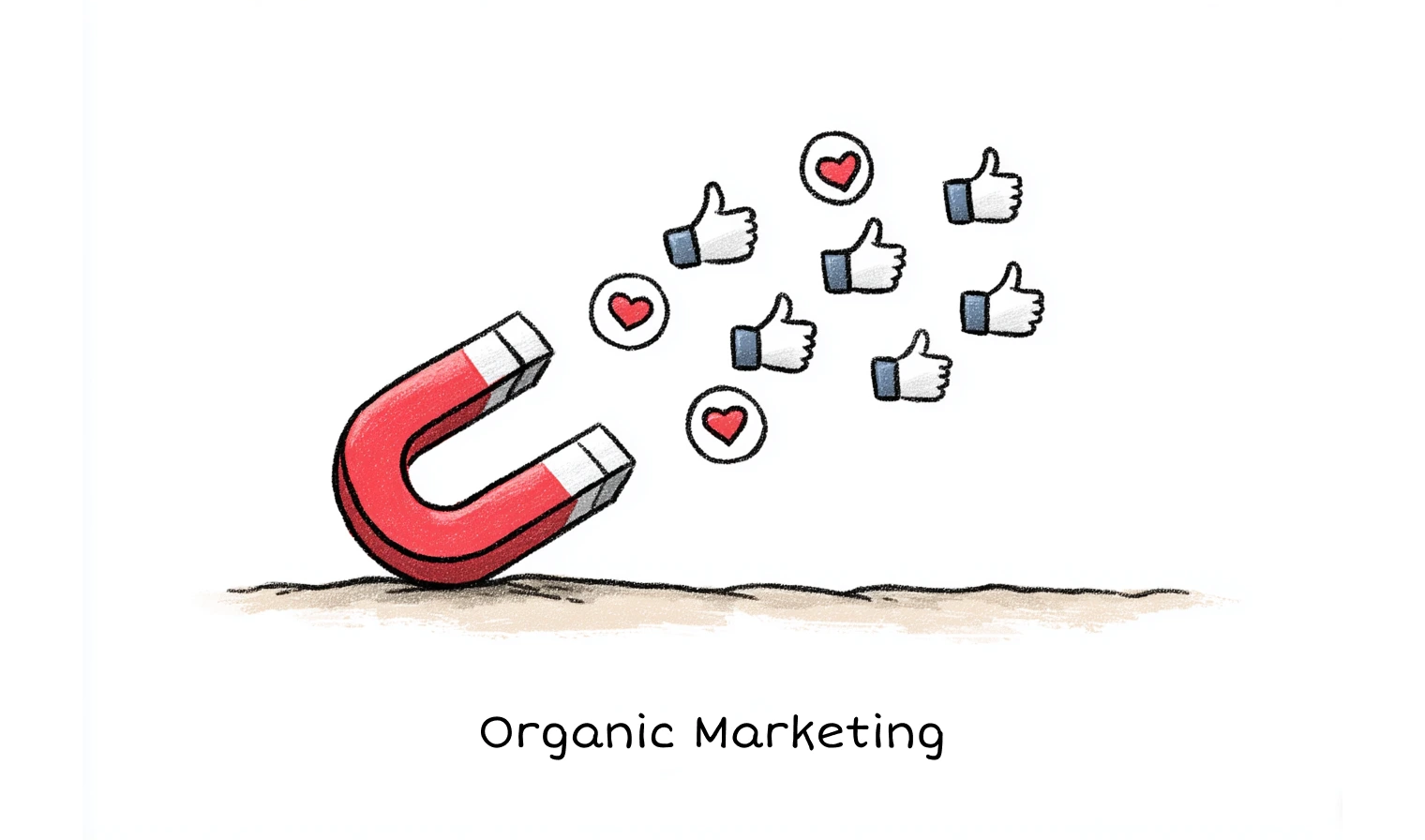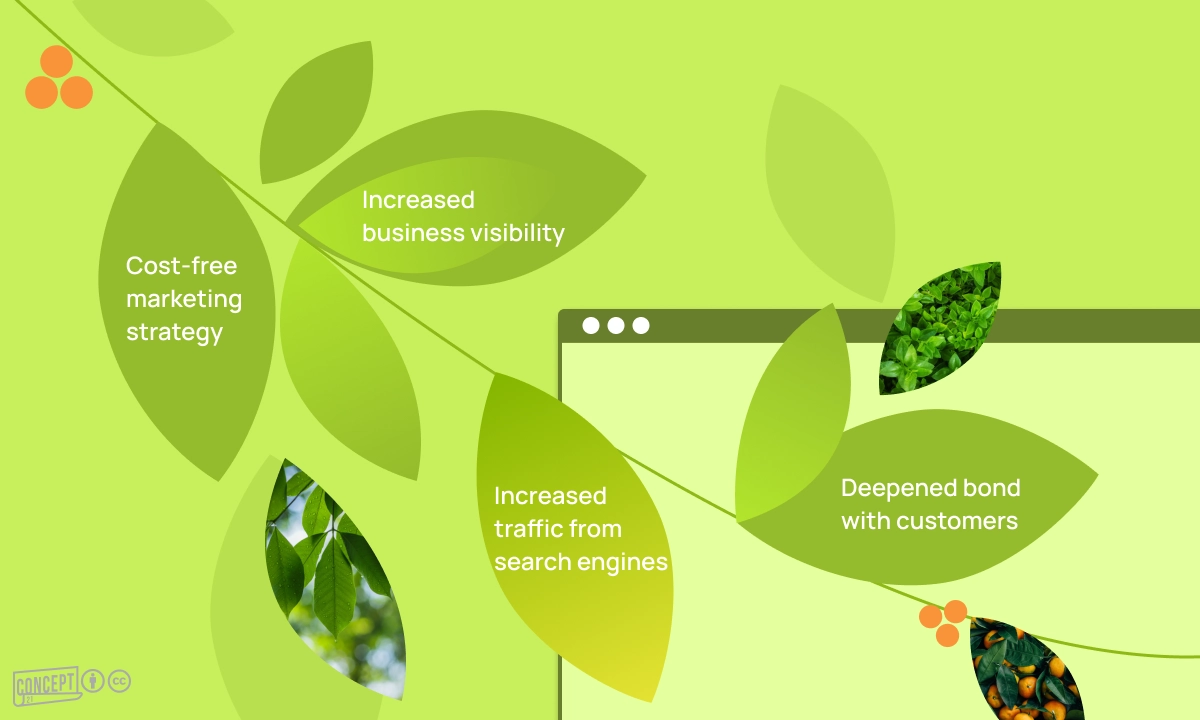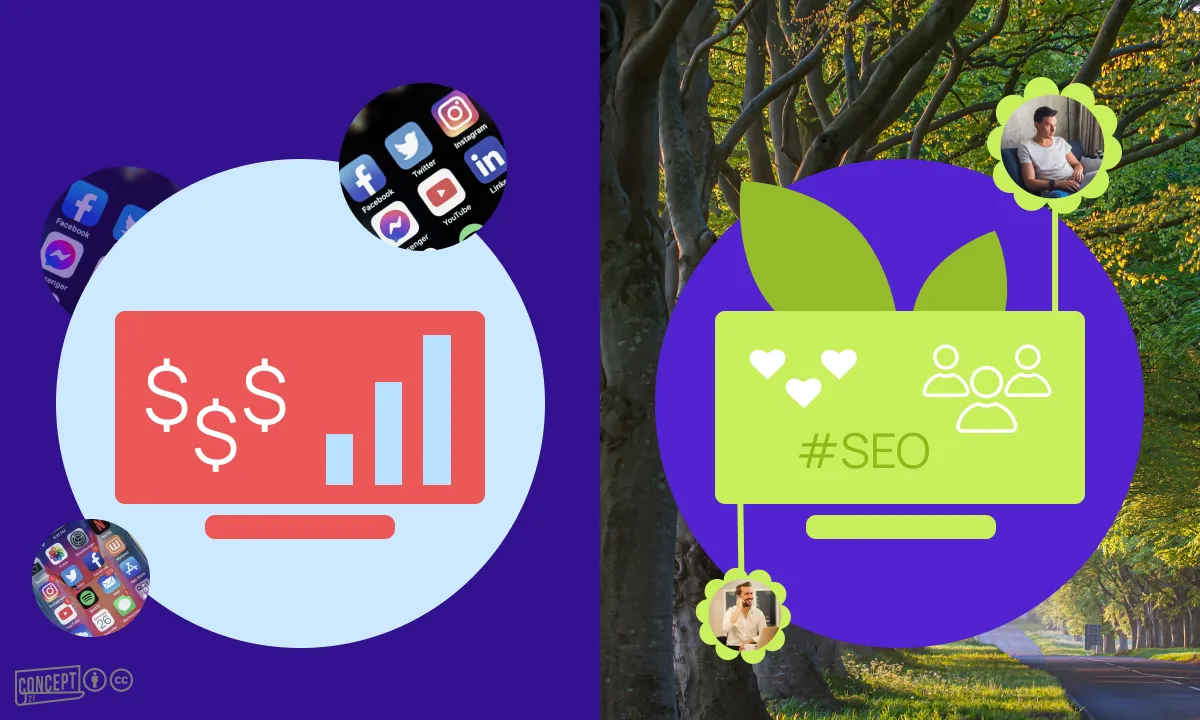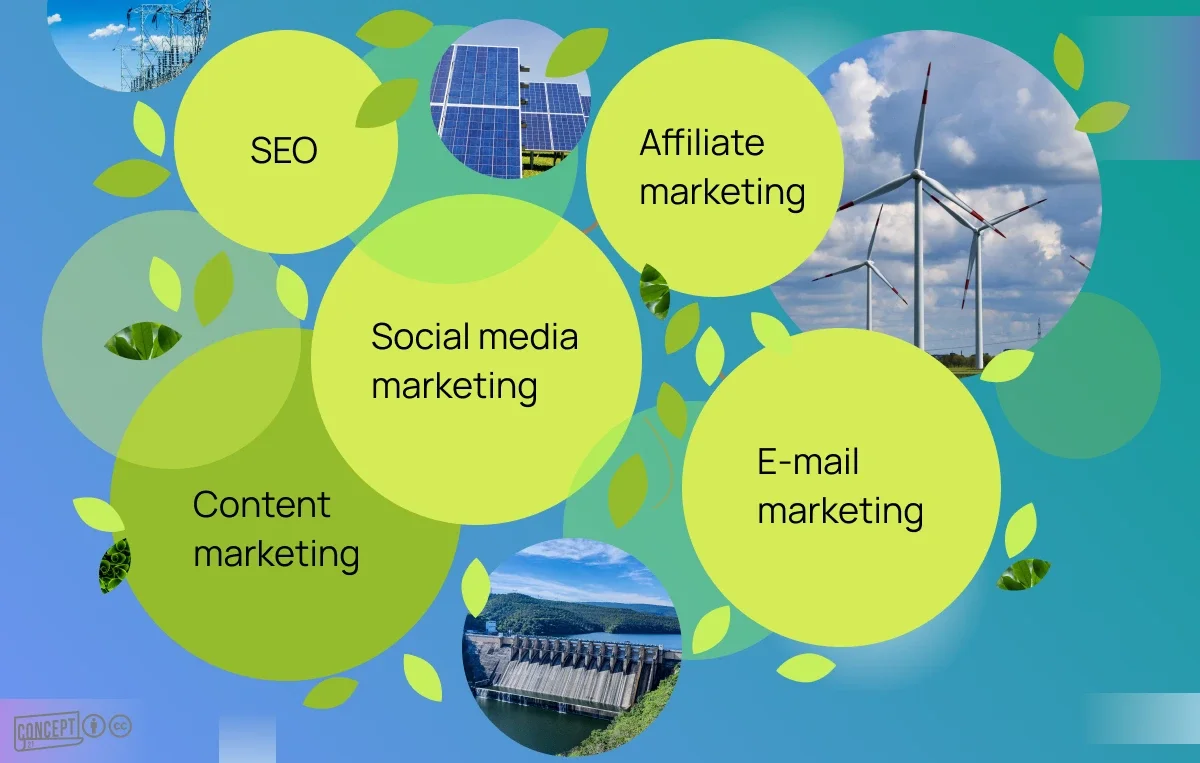Back to all Articles
Organic Marketing: How To Drive Traffic Without Ads?

Imagine waking up to new leads, sales, and messages from people who found your business – completely on their own. No ads. No paid campaigns. Just genuine interest. That’s the magic of organic marketing – a sustainable, authentic way to grow your brand and attract customers who truly connect with what you offer.
Find out how easy it is to start organic marketing today and get access to a high-value free traffic source.
Find out how easy it is to start organic marketing today and get access to a high-value free traffic source.
🔥TL;DR:
- Definition: Organic marketing = earning attention (not buying it) via content, SEO, email, and social media that builds trust over time.
- Why now: Clicks are tighter; trusted answers win.
- Track: impressions from info queries, assisted conversions, subscriber growth.
- When to add paid: to test angles or accelerate what already works.
- Help: CONCEP21 sets up the strategy, experiments, and tracking.
What is a social media campaign?
Organic marketing is the practice of earning traffic and trust through useful content, SEO, email, and community without paying for it. It compounds over time: answer real questions, show proof, capture emails, and keep helping until buyers are ready. Paid can amplify it; it doesn’t replace it.
Types of organic marketing
Organic marketing requires a lot of research and planning to ensure that the best strategies are used to reach the desired audience. Here are some more popular types of organic marketing that work wonders:- Content marketing
- SEO (Search Engine Optimization)
- E-mail marketing
- Social media marketing
- Affiliate marketing
- … and any type of free marketing
Incredible benefits of organic marketing

Increased business visibility
Organic marketing dramatically increases your brand visibility and helps you reach potential customers where they already are. By publishing valuable, keyword-optimized content and applying effective SEO strategies, your website, blog, and social media channels can appear higher on search engine results pages (SERPs). More visibility means more clicks, more engagement, and ultimately, more customers discovering your brand naturally.More traffic from search engines
An effective organic SEO strategy helps your website rank higher for relevant searches. Through keyword research, content optimization, and link-building, you can attract a steady stream of organic traffic without relying on paid ads. Ranking well on Google builds authority and trust, two key factors in driving consistent, high-quality traffic to your site.Cost-free marketing strategy
Unlike paid advertising, organic marketing doesn’t require continuous ad spend. Once your content is published and optimized, it can generate leads and conversions long-term with minimal maintenance. This makes organic marketing one of the most cost-efficient and sustainable strategies for businesses of all sizes: ideal for startups, small businesses, and growing brands looking to maximize ROI.
Stronger customer relationships
Organic marketing isn’t just about visibility - it’s about connection. By creating helpful, authentic content and engaging directly with your audience on social platforms, you build trust and credibility. Over time, this fosters deeper relationships, encourages loyalty, and turns casual visitors into repeat customers who advocate for your brand.Organic marketing vs. paid marketing: What’s the difference?

Area
Organic Marketing
Paid Marketing
Primary goal
Earn trust & steady demand
Rapid reach & testing
Cost model
Time/operations; no CPC
CPC/CPM; budget burns daily
Results
Slow → compounding
Instant → stops when budget stops
Format
Articles, guides, email, community
Ads, sponsored posts, retargeting
Where it shines
Education, authority, retention
Launches, offers, precise targeting
KPI focus
Impressions, subscribers, assisted conversion
CAC, ROAS, lift during promo
Top 5 must-try organic marketing strategies
1. Content marketing
Content marketing is a crucial aspect of organic marketing, as it involves creating and sharing content to reach target audiences. Content marketing can take many forms, including blogs, videos, infographics, and social media posts. Content should be relevant to the target audience, highlighting the business's offerings and providing helpful information.
💡 Try these content marketing activities:
- Create a blog - start regularly writing articles on a topic that you are an expert in
- Leverage your social media game - try different types of content: threads on Twitter, video tutorials on YouTube, reels on Instagram, articles on LinkedIn
- Start a podcast - open an account on Spotify or even YouTube and start sharing your knowledge with others
2. SEO (Search Engine Optimization)
Search engine optimization (SEO) involves optimizing a website's content and structure to increase its visibility in search engine results. SEO helps boost website traffic and visibility to potential customers looking for specific products or services. It also helps to establish a business as an authority in its field. With a well-developed SEO strategy, companies can improve their visibility on search engine results pages, leading to increased website traffic and, eventually, more conversions.
💡 Try these SEO activities:
- Run an SEO audit on your website - find out about what issues prevent you from achieving higher results and fix them
- Make keywords research - learn what keywords you should position your business and content
- Start guest posting - post content created by you on other platforms to get visibility and builds links
3. E-mail marketing
Organic e-mail marketing is an increasingly popular method of connecting with potential and existing customers. It is an effective way to build relationships with your target audience and generate traffic and leads to your website.This type of marketing uses content and design to create engaging messages sent to potential customers. Additionally, organic e-mail marketing effectively builds relationships with your customers by responding to their inquiries and providing them with helpful information.
💡 Try these e-mail marketing activities:
- Start sending emails to every new subscriber/user - build relationships with your customers from the very beginning
- Make personalized emails - add to emails the name of the subscriber or provide them with an offer matching their last purchase
- Share your achievements - don’t be shy and show your customers great results; they also have a part in them
4. Social media marketing
Social media marketing is an excellent tool for organic marketing, as it offers a practical and cost-effective way to reach large audiences. Social media platforms, such as Facebook, LinkedIn, and Instagram, provide an easy way to share content and engage with customers on a personal level.
💡 Try these social media marketing activities:
- Create accounts where your recipients are - you run even the best account on social media, but you won't get clients from it if your recipients don’t see you
- Build a partnership - find brands or influencers with which you will be able to create pleasing cooperation
- Run a giveaway - it’s a great way to get people to engage with your posts and create an interest in your brand
5. Affiliate marketing
Affiliate marketing is organic marketing that involves a company partnering with an online influencer to promote its products and services. This type of marketing consists of the influencer talking about the company's products and services to their followers, who then can purchase the products or services.Affiliate marketing benefits the influencer and the company, as the influencer can monetize their followers while companies benefit from increased exposure and sales.
💡 Try these affiliate marketing activities:
- Find perfect affiliates - many people get involved in affiliate programs, so it shouldn’t be very found to find someone to promote you
- Create must-try deals - the better deal, the better results, so make sure to provide affiliates with an attractive opportunity
- Build your own affiliate program - if you would like to work with multiple affiliates, create your own program when you define the rules of cooperation
Elevate your business with Concept21’s SEO & marketing services

Our team of experts specializes in data-driven SEO, content marketing, and AI-powered optimization that drives measurable results. We don’t just chase rankings – we build strategies that increase visibility, boost engagement, and convert visitors into loyal customers.
Our core services include:
Contact Concept21 today to discover how our SEO and marketing services can transform your online presence.
Our core services include:
- Advanced SEO & AI SEO – From technical audits to on-page optimization, we use intelligent tools and real-time data to ensure your website ranks higher and performs better on search engines.
- Content Marketing & Strategy – Engaging, keyword-rich content that attracts, educates, and converts your target audience.
- Social Media Growth – Authentic engagement and community building across major platforms to strengthen your brand presence.
- Brand & Performance Marketing – Creative campaigns that connect emotionally while delivering measurable ROI.
Contact Concept21 today to discover how our SEO and marketing services can transform your online presence.
F.A.Q
What is organic marketing?
Organic marketing is a form of marketing that focuses on growing a brand’s presence and reach through unpaid, or “organic”, methods.
What are examples of organic marketing?
Examples of organic marketing include content creation and sharing, search engine optimization, social media campaigns, and email marketing.
Why is it worth starting organic marketing?
It is worth starting organic marketing because it is a cost-effective way to reach a wide audience, build trust and credibility, and generate long-term results.
Organic marketing vs. paid marketing: What’s the difference?
The main difference between organic and paid marketing is that organic methods are free or cost-effective, while paid methods require a financial investment.
Is organic marketing really “free”?
You don’t pay per click, but you invest time and optimization. The upside: assets keep working without ongoing ad spend.
Karol Andruszkow
Co-founder and CEO of Concept21
Co-founder and CEO of Concept21
Karol is a serial entrepreneur, e-commerce speaker, and founder of 3 startups. He advised hundreds of companies and led projects worth over EUR 50 million for financial institutions across Europe.
He earned two master's degrees – Computer Science and Marketing Management – in Poland and Portugal. He has 10+ years of experience in Silicon Valley, Poland, Portugal, USA, and UK, helping startups, financial institutions, and SMEs improve operations through digitization.
He earned two master's degrees – Computer Science and Marketing Management – in Poland and Portugal. He has 10+ years of experience in Silicon Valley, Poland, Portugal, USA, and UK, helping startups, financial institutions, and SMEs improve operations through digitization.
Karol Andruszkow
Co-founder and CEO of Concept21
Co-founder and CEO of Concept21
Karol is a serial entrepreneur, e-commerce speaker, and founder of 3 startups. He advised hundreds of companies and led projects worth over EUR 50 million for financial institutions across Europe.
He earned two master's degrees – Computer Science and Marketing Management – in Poland and Portugal. He has 10+ years of experience in Silicon Valley, Poland, Portugal, USA, and UK, helping startups, financial institutions, and SMEs improve operations through digitization.
He earned two master's degrees – Computer Science and Marketing Management – in Poland and Portugal. He has 10+ years of experience in Silicon Valley, Poland, Portugal, USA, and UK, helping startups, financial institutions, and SMEs improve operations through digitization.
SHARE: